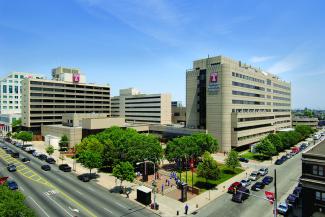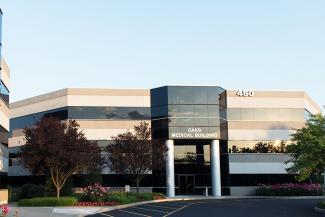As part of the Temple Lung Center, our Diaphragm & Respiratory Muscle Disorders Program is the only one of its kind in the Philadelphia region. Conditions affecting the diaphragm — including diaphragm paralysis and respiratory muscle dysfunction — are not a common focus for many medical professionals. But at Temple Health, we have an experienced medical team and offer a wide range of treatment options.
Our team is made up of pulmonologists, radiologists, thoracic surgeons and technicians who work together to properly diagnose and treat diaphragm disorders. Our goal is to help patients breathe easier and enjoy a better quality of life.
Problems with the Diaphragm
A common but often overlooked source of breathing problems is the diaphragm. The diaphragm is the primary muscle used to breathe, separating the lungs from the abdomen (stomach).
Problems with the diaphragm and respiratory muscles can cause:
- Difficulty breathing
- Chest, shoulder or abdominal pain
- Low levels of oxygen in the blood (hypoxemia)
- Sleep problems
- Breathlessness while lying flat
- Fatigue
Diaphragm Disorders We Treat
There are many kinds of diaphragm and respiratory muscle disorders. The cause and complexity of these disorders can vary widely.
Conditions we treat at Temple include:
- Congenital central hypoventilation syndrome (CCHS)
- Diaphragm eventration — abnormal elevation of one leaf of the diaphragm
- Diaphragmatic hernias — types include Bochdalek hernia (most common) and Morgagni hernia
- Diaphragm paralysis — an uncommon condition where patients lose control of one or both sides of the diaphragm, making it hard to take a normal breath
- Diaphragm weakness
- Management of non-invasive ventilation for neuromuscular conditions
- Respiratory muscle dysfunction
- Ventilator-dependent respiratory failure due to spinal cord injury
Treatments and Procedures Available
Treatment for diaphragm and respiratory muscle disorders depends on the severity of the condition and your symptoms. Some patients may benefit from non-invasive treatments, such as breathing exercises or medication, while others may require surgery.
Diagnostics and Testing
- Assessment of associated sleep-disordered breathing
- Imaging of the diaphragm
- Measurement of diaphragm and respiratory muscle function
Medical Management
- Medication
- Oxygen therapy
- Physical therapy, including respiratory muscle training, breathing exercises and general physical reconditioning
Procedures
- Diaphragm pacemakers
- Diaphragm plication — a procedure to treat diaphragmatic paralysis. It reshapes the diaphragm, helping the lungs expand more efficiently and making it easier for patients to breathe.
Find a doctor near you, request an appointment online, or call 800-TEMPLE-MED (800-836-7536).

